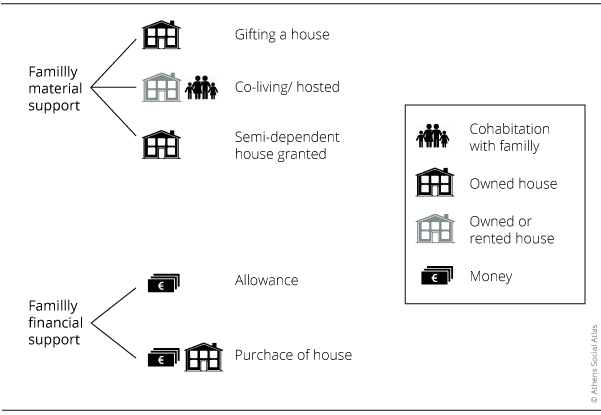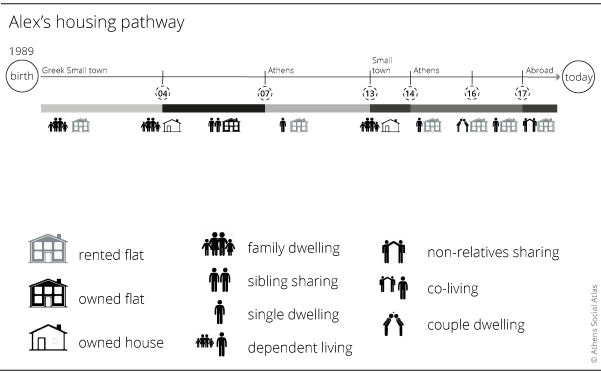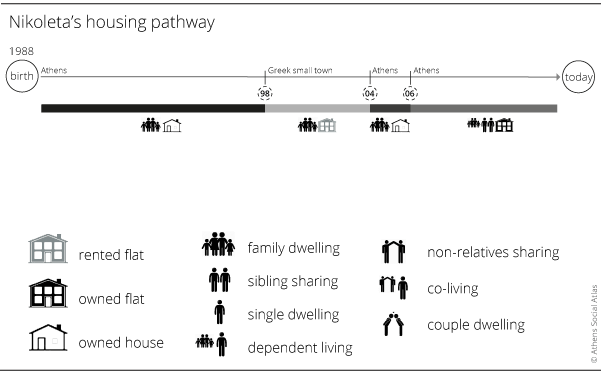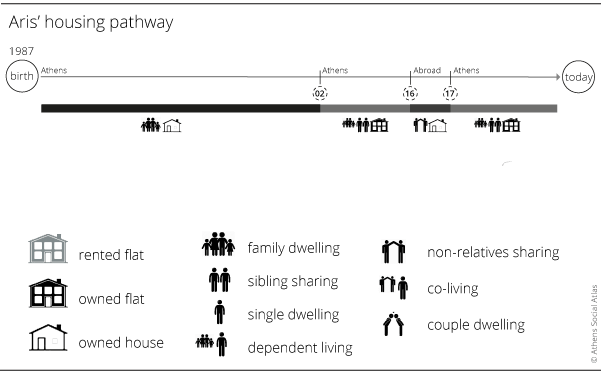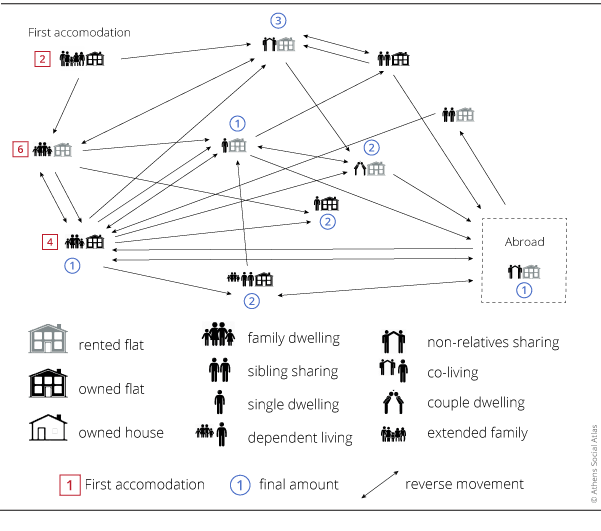When you are granted a home, but you stay in the “closet”. Familism impact on LGBTQ+ housing pathway
Dagkouli-Kyriakoglou Myrto
Housing, Social Structure
2023 | Dec
In a country like Greece with an absent welfare state, and limited and precarious income opportunities, the provision of housing is considered mainly as a family commitment. The family is highlighted as the main shock absorber during socio-economic turbulence (Moreno and Mari-Klose 2013; Martin 2015), and the members who succeeded in their housing strategies during previous, more affluent periods, are now able to offer housing solutions to their family members.
The acceptance of housing support presupposes however the acceptance of control. Thus, family support may assume that the receivers of the support should ‘obey’ the rules and imaginaries that the family attributes to them. These imaginaries often include a prescribed heteronormative lifepath that the beneficiaries should satisfy.
Greek family welfare and home
One could argue that the Greek welfare state was never active enough to cover the needs of its citizens. Greek welfare pattern could be characterised as ‘familialism by default’ where ‘there are neither publicly provided alternatives to nor support for family care’ (Saraceno and Keck, 2010: 676). This is evident in the almost absent residential provision by the state. Housing policies in Greece were always mainly indirect economic indicators that aimed to nurture the self-regulation of housing needs through the support of the family and the kin, by enabling and promoting homeownership (Mantouvalou 1985; Leontidou 1990; Allen et al. 2004, for the state as an enabler see also Tulumello & Dagkouli-Kyriakoglou 2021).
Indeed, throughout the history of post-war Greece, urban home property, promoted or assisted by the state, constituted a good, stable and secure investment in light of the precarious financial climate (Leontidou 1990; Allen et al. 2004). The property could be used as accommodation or a source of income, in the absence of good investment alternatives and the absence of a welfare state (Allen et al. 2004; Gentile 2016; Minguez, 2016). Correspondingly, it always constituted a standard cultural prerequisite to forming one’s family, a collective social desire, a representation of achievement, a status symbol and a proof of commitment to society and the family (Minguez 2016). This practice depended greatly on family savings and wealth, in connection with an underdeveloped local mortgage market and a weak welfare state (Poggio 2008). Therefore, access to homeownership has been stratified unevenly across the generations, penalising those who originate from families in the lower social strata (Micheli and Rosina 2010; Forrest and Yip 2012; Moreno and Mari-Klose 2013; Ronald and Lennartz 2018).
Crisis
Housing and everyday life in Greece have been restructured rapidly during the last decades as a result of the Global Financial Crisis of 2008 and the related austerity measures. The austerity measures imposed deep cuts in the total public expenditure, which impacted the formation of households and the related housing strategies that families adopted in order to face the challenges (Costa Pinto and Guerra 2013; Serracant 2015).
Also, since 2012, Greece has had some of the highest unemployment rates among OECD countries at all educational levels, and today even though it dropped slightly during the last years it is still relatively high (12,16% in 2022 [1] ) while the percentage of youth unemployment is 30,05% in 2022 [2]. Hectic and precarious employment opportunities lead to housing insecurity and postponed life decisions highlighting the role of the family as provider (Christopoulou & Pantalidou 2018).
Family housing strategies
People in Greece tend to follow housing practices in connection to the family welfare, such as late emancipation from the parental home, intergenerational co-residence and residential spatial proximity to the members of the same extended family (Ferrera 2010; Dagkouli-Kyriakoglou, 2018). In the context of Southern Europe, the family home is the base of the asymmetrical heteropatriarchal family, fostering certain heterosexual and gendered relations (Valentine 1993). The profound naturalisation of the heteronormativity that exists in society and at home may consequently ‘exclude’ LGBTQ+ members because of the socio-sexual power relations that are reproduced (ibid.). Moreover, as long as the well-being of these people is dependent on family solutions, the familial wealth reinforces the existing social inequity between those who hold property wealth and those who do not.
The Orthodox Church, in Greece, has a considerable influence on society and promoted, like the right-wing political ideology, the heterosexual family as the core structure of society (Allen et al. 2004; Trihas 2018). The strengthening of the institution of the family and its welfare frees the state from the obligation to offer care, housing and social protection support and its cost. Therefore, other forms of family outside of the heteronormative one could harm this equilibrium that hides the state absence. As bishop Ieronymos stated concerning the debate about the legal gender recognition based on self-determination: ‘All of these are games. The Church has its own stance. Our country has its traditions, and so has the family. All the rest are invented to spend our time’ (‘Ieronymos for gender identity’ 2017). These ideas in this highly religious country are representative also for a part of society and some of them could be parents of LGBTQ+ children as well.
Furthermore, as the crisis in Greece were evolving, the violent manifestations of police forces against socially marginalised groups was increasing as well. In parallel, the power of Golden Dawn, the Greek neo-Nazi party, was strengthening. This formation was part of the parliament for the period 2012 – 2019, promoting homophobia and sexism, while praising heteronormativity (Eleftheriadis 2015). Lately, and after the right-wing government was elected in 2019, the police violence against non-heteronormative subjects and women has increased [3]. Also, gender issues seem to be handled from the state in a way that highlights the superiority of the asymmetrical heteropatriarchal family by queer individuals’ marginalization and social science targeting [4] (Vasilaki & Souvlis 2021). Moreover, the government abolished the general secretariat of gender equality – founded in 1985 as a victory of the feminist movement – and established during the same month (June 2023) a new ministry of Social Cohesion and Family.
Concerning housing, LGBTQ+ people who face discrimination are not protected per se. In other countries, such as the USA and the UK, LGBTQ+ youth has significant representation amongst the homeless population (Hunter 2008). In the societies where the problem is not hidden, there also exist demands to offer welfare services for marginalized social groups, which suffer from housing problems, abuse incidents and discrimination (ibid.). Meanwhile, in Greece, as citizens rely heavily on family-based assistance or informal solidarity networks, the danger of homelessness is related to the ability of a family or kinship to support its members and/or the will of an LGBTQ+ person to hide or suppress their identity and life plans in order not to implicate the support.
Family strategies in LGBTQ+ housing pathway
At least one incident of direct/indirect family support was encountered in each collected story during this research project [5]; there seems to be no particular age at which intergenerational support expires for LGBTQ+ members. The support can come from the parents but also members of the extended family such as in the case of Liza (45, open), who ended up living with her aunt. She decided to cohabitate with her for financial reasons, and even though her aunt “disapproved” of Liza’s personal life, she welcomed the idea of cohabitating as long as she kept her love life away from the house.
Figure 1: Patterns of family and friend’s (family) support
Source: Author’s elaboration (2018)
According to my PhD research in which this paper is only part of, I mapped the family housing supports as such: the support can come in two general ways: in-kind and financial. In-kind support may include granting semi- or in- dependent houses and, allowing and usually insisting on extended cohabitation or returns to the family house. In many of the stories collected, the participants returned to their family homes after being away for a period of time regardless of whether they had come out or not.
In other cases, the support comes financially in the form of direct or indirect housing support. The indirect support regards the situation when parents and other relatives offer (part of) the amount of money that the beneficiary needs in order to acquire and/or renovate a house or to cover the amount of rent. Meanwhile, indirect financial housing support comes in the form of ‘pocket money’ that even though it is not specifically for the payment of rent, it is still a stable financial income that eases one’s household difficulties. Olga (lesbian, 42, closeted) explained this procedure as follows:
| (My) parents are supporting financially both their children [herself and her brother] by providing ‘pocket money’. […] The amount of pocket money is up to 400 euros for my brother and 200 for me. […] Anything that remains [from parents’ incomes], they give it to their children to survive. |
This custom is not unfamiliar in Greek society, where parents tend to strive to offer to their children by all means. However, the support may be accompanied by specific rules that can limit a person’s freedom.
Impact of the LGBTQ+ identity on housing
Housing and financial support from the family can be disturbed as a result of denial or “disapproval” of non-heteronormative subjectivities. For the purpose of this work, the impacts were categorized as direct and indirect.
Only a few stories among the ones collected were about direct impact on housing which lead to homelessness even though this is not representative of the Greek reality (see Pettas, Arampatzi, Dagkouli-Kyriakoglou, 2022). Some of the respondents had to abandon their family homes to claim their identities or the financial support for housing was abruptly terminated. There were three incidents of involuntary displacement which the participants experienced as punishment and blackmail by the family when their sexual orientation was disclosed: in one case it was a “supported displacement” away from the family house that parents payed the rent for the new accommodation; in the second case her girlfriend’s mother offered her a place to live; while in the case of another research partner [6], he had to become financially autonomous and this led him gradually to migrate abroad for better work and housing opportunities. However, the high degree of familism in housing can also cause problems to outsiders, as Orion narrates bellow (31, open):
| From my last home I left because…It was a 3-storey-high, small condominium, which belonged to a family and relatives were inhabiting in all the apartments except mine. […] I was the only stranger. […] in the second year they saw me one morning, in the dawn, to return from the drag show and they saw me like this [dressed as their drag persona], so since then and until my contract expired […] a war began, something like ‘we do not want you here, go away’ |
All in all, there were violent changes in the living arrangements of LGBTQ+ people when the family who supported them could not accept their sexual identity. To these “housing inconveniences” as a result of one’s sexual identity, we should also consider the “indirect” impacts, especially concerning the limitation to the freedom of living a non-heteronormative personal life as long as people are enjoying housing solutions supported by their families.
Support can be accompanied by a code of (heteronormative) behaviour, such as in the story of Liza (45, open) that she was hosted, after she left her house by her partner’s mother. Her girlfriend’s mother required both Liza and her daughter to stay “in the closet” as long as they were enjoying the housing support. This story echoes the one of Alex, who explains that:
| My sisters and my brother were more or less ok [when they found out that he is gay] the important for them was not for the parents to find out like… never |
Figure 2: Alex’s housing pathway
Source: Author’s elaboration (2018)
Non disclosing their sexual orientation was ordered or implied by the parents or other relatives. Whether this is an order or is practiced by the fear of the LGBTQ+ person to disclose their sexual identity, there are obvious implications on the romantic life of the people. This is more evident when they are supported by the family and especially when they still cohabitate with their parents or live in proximity. Nikoleta (28, hidden) that she lives in the same condominium with her parents explains for example that:
| They [the parents] never restricted me in bringing someone or anything… but certainly if I lived by myself in another house, I know it would be easier […] for example, before I disclosed to my parents, I was preoccupied that when she [her girlfriend] leaves from the house someone could […] see her. Or they can ring the bell and because it would be weird for her to be always around, she would hide in the room […] Ideally, I would like to live in another house, to be by myself, to be autonomous and to be possible for everyone to come |
Figure 3: Nikoleta’s housing pathway
Source: Author’s elaboration (2018)
Similarly, Aris (30, closeted) who insisted on staying in the parental house regardless the obstacles described that:
| I will bring him (a future boyfriend) at home obviously as a friend. He will enter. He
will come and go, he may even stay over. But he will stay over with the quality of the friend. […] and if we have sex, we will do it secretly in order not to be heard |
Figure 4: Ari’s housing pathway
Source: Author’s elaboration (2018)
Given that same-sex partners are generally not accepted, LGBTQ+ couples cannot enjoy quality time at their partners’ places even when they are disclosed. All in all, with Alex’s words: ‘Certainly, the freedom inside a house is really important for a relationship [to grow]’ this is even more crucial for a social group who cannot express themselves freely everywhere outdoors in such a conservative and hostile context.
Moreover, as family is central in the social life of young people in Greece, the restriction not to disclose their romantic relationships to their family has further implications as not being able to join and enjoy family events in full disclosure. As one of my research partner explained, he feels excluded from family moments as he cannot experience holidays or special celebrations as the heteronormative members of the family, i.e. he cannot attend with his partner or discuss about his personal life.
All in all, according to this limited research, the housing strategies of LGBTQ+ people are linked with strategies related to the disclosure of their sexual identities, either regarding the ‘coming out’ decision or the degree of the expression of freedom in order to “qualify” for housing support from their families. As Rodó-de-zárate, (2013, 8) also noted they are ‘play(ing) with their identities to gain normative heterosexual privileges’. In most of the cases of this study, people found ways to conceal or to negotiate their rights to their personal lives without losing their families’ support but “only” suffering the indirect impact. How indirect is indeed the impact?
Concluding thoughts
Through the housing support that Greek families strive to offer, they also strengthen their control over the beneficiaries. Indicatively, people who accept support from their families are usually accountable to them regarding their personal life. This research, albeit restricted in time, place and sample, demonstrated that the LGBTQ+ community still carries a social stigma which can become a hindrance in receiving housing support. Thus, for LGBTQ+ people to enjoy a housing solution, they may have to conceal parts of their real identity, given that the home still remains a strongly heteronormative structure that imposes rules that could suppress the freedom of dependent members.
The research partners and other social groups in Greece, for example the perceived as female inside the family, are trapped in this inter-generational support reciprocity that entangles housing solutions and personal life (see also Dagkouli-Kyriakolgou, 2021). The persons who receive housing support have to guide their life into the direction they are expected to, that is, a heteronormative, family/kinship-centric life with conventional milestones, such as marriage and childbirth, and lifelong devotion to the kinship’s needs. In case the personal life is disapproved, there is possibility that the support can be disrupted even violently or to be handled in order to blackmail the beneficiary. On the other hand, the receiver of the support could either refuse it (and thus also refuse the identity that was attributed to them) or conceal their identity in order to continue benefiting from the support in a context of absent housing policies and a rapid housing commodification.
LGBTQ+ cannot and should not rely solely on Greek family welfare for housing, no more than any other person should. There is need for further place-sensitive research to produce a better understanding of the complex ways by which sexuality and gender performativity, among others, define housing pathways and related difficulties. Housing policies that aim to support regardless heteronormative criteria as well as a housing stock that could accommodate more forms of family than the heteropatriarchal should be demanded.
Figure 5: LGBTQ+ path. Housing pathways of the research partners
Source: Author’s elaboration (2018)
[1]: https://www.statista.com/statistics/263698/unemployment-rate-in-greece/
[2]: https://www.macrotrends.net/countries/GRC/greece/youth-unemployment-rate e
[3]: «Αστυνομική βία: Δύο χρόνια “μεμονωμένων περιστατικών”», tvxs, 2021, https://tvxs.gr/news/ellada/tvxsgr-katagrafei-dyo-xronia-memonomenon-peristatikon-astynomikis-bias-binteo
[4]: https://www.epohi.gr/article/38406/ti-kryvetai-pisv-apo-ti-stoxopoihsh-koinvnikvn-episthmvn-kai-episthmonvn
[5]: However, there is research that highlights more nuanced stories where no support was present and people had to rely on solidarity or support networks (Pettas et al., 2022).
[6]: By research partners I am referring to the participants/interviewees of this research.
Acknowledgements
The article is partly based on the: Dagkouli-Kyriakoglou, M. (2021). ‘When housing is provided, but you have only the closet’. Sexual orientation and family housing support in Athens, Greece. Social & Cultural Geography. DOI: 10.1080/14649365.2021.1910989
Entry citation
Dagkouli-Kyriakoglou, M. (2023) When you are granted a home, but you stay in the “closet”. Familism impact on LGBTQ+ housing pathway, in Maloutas T., Spyrellis S. (eds) Athens Social Atlas. Digital compendium of texts and visual material. URL: https://www.athenssocialatlas.gr/en/article/familism-impact-on-lgbtq-housing-pathway/ , DOI: 10.17902/20971.115
Atlas citation
Maloutas T., Spyrellis S. (eds) (2015) Athens Social Atlas. Digital compendium of texts and visual material. URL: https://www.athenssocialatlas.gr/en/ , DOI: 10.17902/20971.9
References
- Allen, J., Barlow, J., Leal, J., Maloutas, T., & Padovani, L. (Eds.). (2004). Housing and Welfare in Southern Europe. Blackwell. https://doi.org/10.1002/9780470757536
- Christopoulou, R., & Pantalidou, M. (2018). Who saved Greek youth? Parental support to young adults during the great recession.
- Dagkouli-Kyriakoglou, M. (2018). The ongoing role of family in the provision of housing in Greece during the Greek crisis. Critical Housing Analysis, 5(2), 35. https://doi.org/10.13060/23362839.2018.5.2.441
- Dagkouli-Kyriakoglou, M. (2021). ‘Keeping the children close and the daughters closer.’ Is family housing support in Greece gendered?. European Journal of Women’s Studies DOI: 10.1177/1350506821104680
- Dagkouli-Kyriakoglou, M. (2021). ‘When housing is provided, but you have only the closet’. Sexual orientation and family housing support in Athens, Greece. Social & Cultural Geography. DOI: 10.1080/14649365.2021.1910989
- Eleftheriadis, K. (2015). Queer responses to austerity: insights from the Greece of crisis. ACME: An International Journal for Critical Geographies, 14(4), 1032-1057.
- Hunter, E. (2008). What’s good for the gays is good for the gander: Making homeless youth housing safer for lesbian, gay, bisexual, and transgender youth. Family Court Review, 46(3), 543-557.
- Ieronymos for gender identity: Greece has traditions, all the rest is invented. (2017, October 2). TVXS. Retrieved from http://tvxs.gr/news/ellada/ieronymos-gia-taytotita-fyloy-iellada-exei-paradoseis-ola-ta-alla-einai-efeyrimata. (in Greek)
- Leontidou, L. (1990). The Mediterranean city in transition: Social change and urban development. Cambridge: University Press.
- Mantouvalou, M. (1985). Building in Athens after the war: Economic and social views of an opportunistic development, Athens as it (does not). look. 1940-1985 Report of Hellenic Ministry of Culture, Education and Religious Affairs. Retrieved from http://courses.arch.ntua.gr, (accessed in 22/3/16, in Greek).
- Martin, C. (2015). Southern Welfare States: Confguration of the Welfare Balance between State and the Family. In M. Baumeister & R. Sala (Eds.), Southern Europe? Italy, Spain, Portugal & Greece from the 1950s until the present day (pp. 77-100). New York/Frankfurt: Campus.
- Moreno, L. & Marí-Klose, P. (2013). Youth, family change and welfare arrangements: is the South still so different?. European societies 15(4), 493-513.
- Pettas, P., Arampatzi, A. & Dagkouli-Kyriakoglou, M. (2022) LGBTQ+ housing vulnerability in Greece: intersectionality, coping strategies and, the role of solidarity networks, Housing Studies, DOI: 10.1080/02673037.2022.2092600
- Rodó-de-zárate, M. (2013). Young Lesbians Negotiating Public Space: An Intersectional Approach through Places. Children’s Geographies, 13(4), 413–434. https://doi.org/10.1080/14733285.2013.848741
- Saraceno, C., & Keck, W. (2010). Can we Identify Intergenerational Policy Regimes in Europe?. European Societies, 12(5), 675-696.
- Serracant, P. (2015). The Impact of the Economic Crisis on Youth Trajectories A Case Study from Southern Europe. Young, 23(1), 39-58.
- Trihas, N. (2018). Travel motivations, preferences and perceptions of Greek gay men and lesbians. Tourism Today, 17, 7–26. https://docs.wixstatic.com/ugd/79301e_e018b60e5c964470bcfc5edb7351bd65.pdf
- Tulumello S., Dagkouli-Kyriakoglou M. (2021). Financialization of housing in Southern Europe: Policy analysis and recommendations. Final report – final version – submitted 28/01/2021.
- Valentine, G. (1993). (Hetero)Sexing Space: Lesbian Perceptions and Experiences of Everyday Spaces. Environment and Planning. D, Society & Space, 11(4), 395–413. https://doi.org/10.1068/d110395
- Vasilaki, R., & Souvlis, G. (eds.) (2021). The Normalization of Far-Right Discourse in Greece: Gender, Media, Armed Forces, Church. Rosa Luxemburg Foundation (in Greek)

